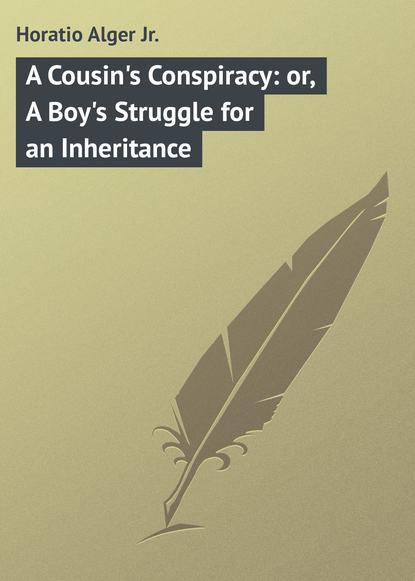По всем вопросам обращайтесь на: info@litportal.ru
(©) 2003-2025.
✖
A Cousin's Conspiracy: or, A Boy's Struggle for an Inheritance
Настройки чтения
Размер шрифта
Высота строк
Поля
Had the outlaw been aware that Ernest had in his possession the packet of bonds which had impelled his brother to make him a captive his zeal would have been increased. He knew, of course, that the bonds would be taken from him and he could conceive of no chance of the boy’s recovering them.
They flew over the ground, maintaining the same relative distance. But there was an unexpected contingency that worked to the disadvantage of Ernest.
Directly in his path was a projecting root which in his haste escaped his notice. He tripped over it, and as a natural consequence he measured his length on the ground.
The outlaw’s face lighted up with exultation. Now the issue was no longer doubtful.
Before Ernest could recover himself and rise to his feet John Fox was upon him.
He flung himself on the prostrate boy and clutched him in a firm grasp.
“Now I have you,” he said. “You were a fool to run. You might have known that you could not escape.”
“I came near it, though,” gasped Ernest, quite out of breath. “Let me up.”
“Will you promise to go with me without giving me any more trouble?”
“I will make no promises,” said Ernest.
“Then it will be the worse for you,” said the outlaw vindictively.
What he proposed to do must remain unknown, for as he spoke a hand was thrust into his neckcloth and he was jerked violently to his feet.
CHAPTER XXII
CASTRO TO THE RESCUE
Bewildered and angry, John Fox looked to see who was his assailant. He found himself confronted by a tall, muscular Indian, whom Ernest also recognized as the man whose child he had saved from a watery grave.
“What do you mean by this outrage?” demanded the outlaw angrily.
“Why are you hurting him?” said the Indian, pointing to Ernest.
“Because I choose to.”
“Me stop you,” said the Indian calmly.
“I have a great mind to shoot you.”
This was an empty threat, for his weapon had been taken by the Quaker detective.
The only answer made by the Indian was to produce a revolver, which he pointed at the breast of the outlaw.
“Two play at that game,” he answered.
John Fox shrank back, for it takes a man of nerve to face a revolver. He began to remonstrate.
“What interest have you in that boy?” he asked.
“He save my little boy from drowning,” answered the Indian. “Will you go or shall me shoot?”
There was but one answer to make to this question. John Fox turned about and walked quietly away without a word.
Ernest grasped the Indian’s hand gratefully.
“I can’t thank you enough,” he said. “You have perhaps saved my life.”
“You save my little boy.”
“Do you know that man?”
“No.”
“It was John Fox, one of the Fox brothers, the famous outlaws.”
“Humph! I have heard of him. How did he catch you?”
Ernest told the story. He also told of the commission he had from the Emmonsville bank.
“I am going to ask you a favor,” he asked.
“What is it?”
“I want you to go with me to the bank at Lee’s Falls. I have a package of bonds to carry there and I don’t think it safe to go alone. I will see that you are paid for your time and trouble.”
“I will go.”
Under the guidance of his Indian friend Ernest reached Lee’s Falls. The bank was closed, but the cashier was still in the bank building, having been detained after hours. Seeing him through the window, Ernest knocked and obtained admission.
“The bank is closed, young man,” said the bank officer.
“I know it, but I have a package of bonds from the bank in Emmonsville. I hope you will take them from me, for I don’t want the responsibility of them any longer.”
“Oh, you are the young messenger. We had advice that you would be here yesterday.”
“So I should have been, but for my capture by one of the Fox brothers.”
“And how did you escape?” asked the wondering cashier.
“Please take the bonds and I will tell you. I spent two nights in the outlaws’ cave. This afternoon I managed to get away.”
“But were not the bonds taken from you?”
“Yes, but I recovered them.”
Ernest, without waiting for further questions, told the story as briefly as possible.
“So, after all,” he concluded, “I should have been taken again but for my friend here,” laying his hand upon the Indian’s shoulder. “I told him you would pay him for his trouble in accompanying me.”











